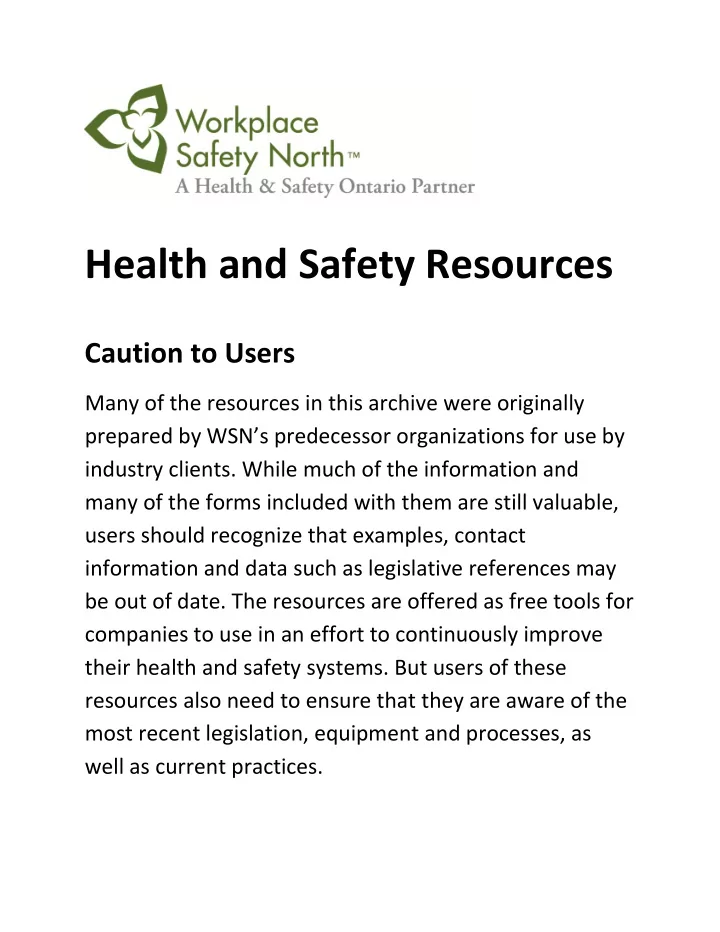

Health and Safety Resources Caution to Users Many of the resources in this archive were originally prepared by WSN’s predecessor organizations for use by industry clients. While much of the information and many of the forms included with them are still valuable, users should recognize that examples, contact information and data such as legislative references may be out of date. The resources are offered as free tools for companies to use in an effort to continuously improve their health and safety systems. But users of these resources also need to ensure that they are aware of the most recent legislation, equipment and processes, as well as current practices.
Fire Safety slide #1 – Fire Safety
What We’ll Cover • Are you ready for the fire challenge? • Fire classifications • Using the right extinguisher • Major causes of industrial fires slide #2 • Controlling fire hazards • Handling flammable liquids • PASS that extinguisher, please • Fire prevention – Fire Safety
Are you ready for the fire challenge? Do you know: • the difference between Class A, B, C and D fires? • what type of extinguisher to use on an electrical fire? • if your work extinguishers are checked regularly? • if your work fire exits or ceiling sprinklers are obstructed? slide #3 • if grounding wires are attached to your storage drums? • If flammable liquid containers are kept in a fire-resistant storage cabinet? • if your company uses bonding wire or an anti-static hose when pouring flammable liquids from drums into smaller containers? • how often all electrical and mechanical equipment is checked? • the details of your company fire plan? – Fire Safety
What is Fire? slide Fire Tetrahedron #4 – Fire Safety
Fire Classifications A • Ordinary combustibles (wood, paper, cloth, rubber, plastics, etc.) • Symbol is a green or metallic triangle B • Flammable liquids • Symbol is a red or metallic square C • Live electrical current is present • Symbol is a blue or metallic circle slide #5 D • Certain combustible metals (aluminium, magnesium, sodium, etc.) • Symbol is a yellow or metallic star • Commercial kitchen fires such as burning oils and grease K • Symbol is a purple stop-sign shape. Recently, new picture symbols have been developed for identifying fire classifications. Make yourself familiar with both styles – Fire Safety
Using the right extinguisher for the job Type What’s Burning Contents of Extinguisher Wood, paper, Water - type, foam, halon, multi- A purpose dry chemical rags, rubber, etc. Carbon dioxide, dry chemical, B Flammable liquids, foam, multi-purpose dry gases, grease chemical, water fog, halon slide Live electrical C Multi-purpose dry chemical, dry #6 current chemical, carbon dioxide, halon Special dry chemical D Burning metals (i.e. sodium chloride base) Vegetable or Potassium Acetate Solution, will K foam up to crate a barrier animal oils between the oil and O2. – Fire Safety
Major Industrial Fire Causes • Electrical or mechanical failure • Improper handling of flammable liquids slide #7 • Sparks from cutting / welding • Poor housekeeping • Careless smoking • Arson – Fire Safety
Controlling Hazards – Flammable Liquids • Remove any sources of ignition • Provide continuous ventilation slide #8 • Use proper handling procedures • Install drum and storage cabinets • Post warning signs – Fire Safety
Controlling Hazards – Mechanical • Conduct regular maintenance inspections • Perform pre-op checks slide #9 • Provide ABC extinguishers • Install fire suppression / sprinkler systems – Fire Safety
Controlling Hazards – Electrical • Conduct regular maintenance • Perform pre-op checks • Check outlets, cords, slide sockets circuits, etc. #10 • Do not overload circuits • Install ground fault circuit interrupters • Check recommended power ratings for correct amperage • Provide ABC extinguishers – Fire Safety
Controlling Hazards – Poor Housekeeping • Clean up spills immediately • Properly dispose of waste • Keep flammables away from ignition sources slide #11 • Keep work area free of unnecessary flammables • Maintain clean surfaces • Don’t obstruct sprinklers – Fire Safety
Controlling Hazards – “Hot Work” • Obtain proper “hot work” permits • Provide ABC extinguishers • Wet down areas before working • Perform pre-op checks slide #12 • Keep immediate area free of flammables • Use fire guards • Check work area afterwards • Properly store / secure gas cylinders – Fire Safety
Controlling Hazards – Careless Smoking • Obey all smoking regulations slide #13 • Make sure it’s really out – Fire Safety
Handling Flammable Liquids • Flammable liquids should be stored in approved safety containers with vapor-tight, self-closing covers • Minimize the build-up of static electricity by slide bonding and grounding metal containers #14 • Use a ground wire from the drum to an earth ground for as long as a drum is in use • Attach a bonding wire from the container to the drum before filling the container – Fire Safety
Flammable Liquids Safe Set-Up Proper set-up of drum, container, ground and slide bonding wire #15 One gallon of gasoline exploding has the same energy as 81 lbs. of dynamite – Fire Safety
PASS that extinguisher, please! P ull the pin at the top of the extinguisher A im the nozzle towards the base of the fire slide #16 S queeze the handle S weep the nozzle back and forth – Fire Safety
Fire Workout • Respect how serious fire can be • Learn to recognize and control all types of fire hazards at your facility • Review your company fire plan slide #17 • Practice safe work habits • Dispose of oily rags and other flammable waste in fire-proof containers • Prevent fires – don’t fight them – Fire Safety
Recommend
More recommend